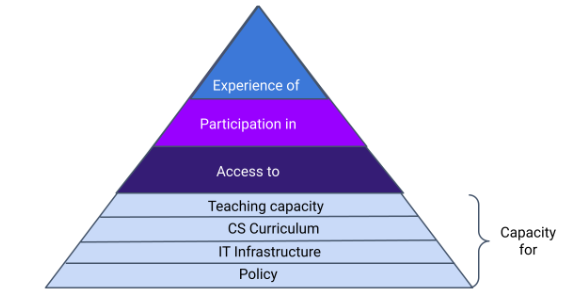
We conducted survey research in 2020/2021 investigating the capacity for delivering computing education in four Sub-Saharan African countries: Botswana, Kenya, Nigeria and Uganda, countries. These countries are in different geographic regions as well as in different income brackets.
We analysed the findings against the CAPE framework: Capacity for, Access to, Participation in and Experience of CS education.
From the project, we were able to contribute a paper to the ACM Transactions in Computing Education journal, which was (finally) published in 2023.
With researchers in the team from Botswana, Uganda, Kenya and Nigeria, we reviewed the capacity issues of curriculum and policy around computing education in each country. We then surveyed 58 teachers about the infrastructure, resources, professional development, and curriculum for computing in their country. We used a localised version of the MEasuring TeacheR Enacted Computing Curriculum (METRECC) instrument for this purpose.
We compared the results from a previous iteration of the METRECC survey with high-income countries conducted in 2019. We identified similarities and differences in the data from teachers who completed the original METRECC survey and African teachers. The data revealed statistically significant differences between the two data sets in relation to access to resources and professional development opportunities in computer studies/computer science, with the African teachers experiencing more barriers. Results further showed that African teachers focus less on teaching algorithms and programming than teachers from high-income countries. In addition, we found differences between African countries in the study, reflecting their relative access to IT infrastructure and resources.
From this research we also were able to contribute to the development of the CAPE framework by expanding on the ‘Capacity for’ aspect. In order to develop equity in computer science education there are several aspects of Capacity to consider: Policy, IT Infrastructure, CS Curriculum and Teaching capacity. We suggest that all low and middle income countries will need to address these needs for CS before they are able to ensure that all children are able to participate fully in CS education.

The data set is publicly available:
Tshukudu, E., Sentance, S., Adelakun-Adeyemo, O., Nyaringita, B., Quille, K., & Zhong, Z. (2023). Investigating K-12 computing education in four African countries (Botswana, Kenya, Nigeria, and Uganda). ACM Transactions on Computing Education, 23(1), 1-29.